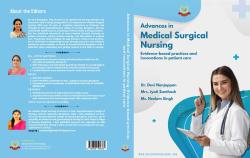ADVANCES IN MEDICAL SURGICAL NURSING: EVIDENCE-BASED PRACTICES INNOVATION IN PATIENT CARE (Managing Post-Operative Complications Case Studies and Best Practices)
Abstract
Post operative complications remain a critical concern in surgical care, often determining patient outcomes and healthcare resource utilization. This chapter provide a comprehensive exploration of the identification, management, and prevention of post operative complications through a humanized approach. By integrating evidence -based practices with real world case studies, we aim to bridge the gap between clinical guidelines and individual patient care. The chapter begins with an overview of common post operative complications, including infections, thromboembolic events, anastomotic leaks, and organ dysfunction. Each complication is analysed in the context of risk factors, early detection strategies, and management protocols. Special emphasis is placed on patient- centred care, highlighting communication, empathy, and shared decision making in addressing these challenges. Through detailed case studies, we illustrate the complexity of real-world scenarios and the application of multidisciplinary strategies to optimise outcomes. These cases also underscore the importance collaboration among surgical teams, anaesthesiologists, nursing staff, and rehabilitation specialists. Finaly the chapter presents best practices for minimising complications, focusing on pre-operative optimization, intra- operative vigilance, and post operative monitoring. By integrating clinical innovation with a humanised perspective, this chapter aim to enhance the quality and safety of surgical care while prioritizing the wellbeing of patients and their families. This resource serves as a valuable guide for surgeons, health care professionals, and trainees, offering actionable insights to improve patient outcomes and foster a culture of compassionate care.









